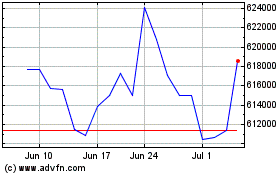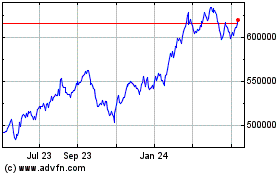Germany's E.ON Faces Renewed Criticism for Uniper Spinoff
October 09 2016 - 9:50PM
Dow Jones News
FRANKFURT—Germany's E.ON SE came under renewed criticism on the
weekend from investors who compared its breakup strategy
unfavorably with that of RWE AG, a rival utility that floated its
renewable power business on Friday.
"RWE's move to spin off the renewables unit was the smarter
move," said Thomas Deser, a portfolio manager with Union
Investment, which holds 0.5% in E.ON.
Both E.ON and RWE have pursued radical splits in response to
changes in German energy policy, with the government pushing the
country toward renewable power and away from fossil fuels and
nuclear energy. The shift has left utilities with billions in
losses and liabilities related to shutting down nuclear plants.
RWE spun off 25% of its renewables, retail and grid operations
in Innogy SE Friday, giving the unit a clean break from
conventional energy and raising 5 billion euros ($5.6 billion) in
proceeds. E.ON did the opposite in September, floating more than
50% of its conventional coal and gas activities as Uniper SE.
Mr. Deser and analysts said RWE took a better path. The proceeds
raised from floating new shares in Innogy ensured RWE was
well-funded and could meet future liabilities, Mr. Deser said. The
proceeds will help RWE pay potential liabilities connected to
winding down nuclear plants and storing waste.
E.ON's spinoff of Uniper didn't generate funds because the
utility distributed Uniper shares to its own shareholders. E.ON
itself now focuses on renewables but also retains German nuclear
operations, meaning both E.ON and Uniper are saddled with troubled
businesses.
Knight Vinke, another large investor in E.ON, is also
disappointed. Founder Eric Knight told The Wall Street Journal this
weekend his fund presented an alternative deal structure in August
that would have brought well above €2 billion in fresh capital to
E.ON and Uniper.
Knight Vinke said it would have injected €600 million into E.ON
and acquired the 47% Uniper stake E.ON still holds in a step that
valued the unit at €3 billion.
People familiar with the matter said Knight Vinke's plan piqued
the interest of potential co-investors, including Warren Buffett's
Berkshire Hathaway Inc. The investment company didn't respond to an
email seeking comment.
E.ON decided against the plan because it would have triggered a
hefty tax payment and because the company believed the proposal
undervalued Uniper, according to people familiar with the matter.
E.ON declined to comment.
"There are more uncertainties around E.ON because they need to
raise capital for nuclear liabilities at a depressed share price
level. They could alternatively sell some assets but not too many
because that could compromise the attractiveness of their shares,"
Union Investment's Mr. Deser said.
Analysts have echoed those concerns. Barclays Capital said in a
recent note that worries about E.ON's capital strength would
persist even it if launched a "€2.4 billion capital increase to
cover the expected nuclear" expenses.
Knight Vinke continues to push E.ON management to consider other
measures aimed at cleaning house, including selling its grid unit,
people familiar with the matter said.
Knight Vinke declined to comment except to say it looked forward
"to continuing the very cordial and constructive relationship with
both E.ON and Uniper."
Monica Houston-Waesch contributed to this article.
Write to Eyk Henning at eyk.henning@wsj.com and Giles Turner at
giles.turner@wsj.com
(END) Dow Jones Newswires
October 09, 2016 21:35 ET (01:35 GMT)
Copyright (c) 2016 Dow Jones & Company, Inc.
Berkshire Hathaway (NYSE:BRK.A)
Historical Stock Chart
From Mar 2024 to Apr 2024

Berkshire Hathaway (NYSE:BRK.A)
Historical Stock Chart
From Apr 2023 to Apr 2024
